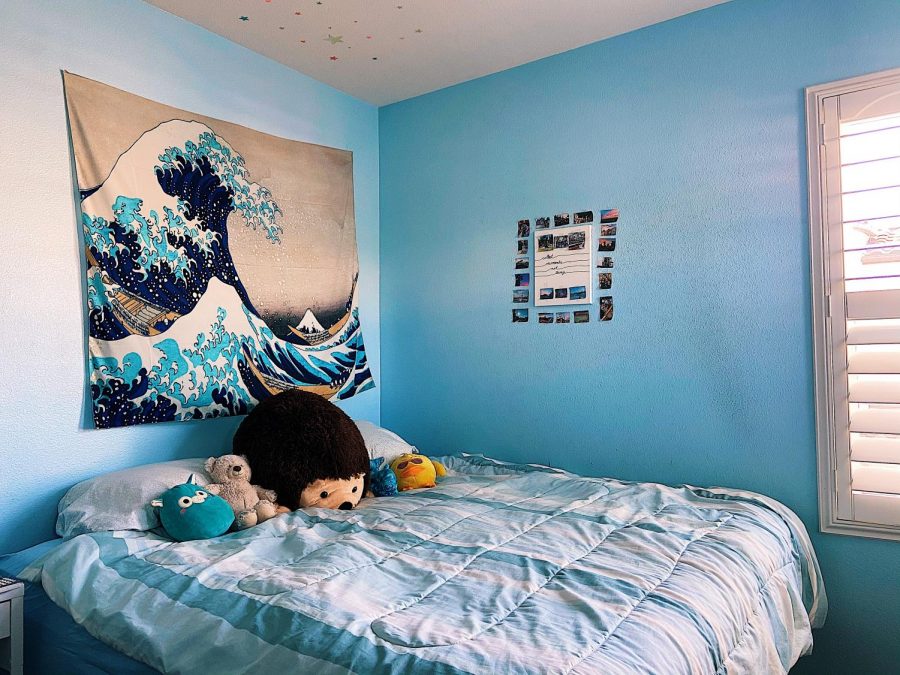Are Students Gaining Sleep Because of Online School?
Because of the COVID-19 pandemic, Yorba Linda High School is entirely online right now. Is online school affecting the sleep of the student body?
October 23, 2020
Sleep is something many students wish they had more of. Being in school is synonymous with getting practically no sleep, as students have to wake up early to attend school, sleepily get through their classes, do their extracurriculars, spend way too much time doing homework, and eventually go to sleep very late. However, our school looks entirely different since it is currently online. Instead of having to go to an actual school, classes are done at home, and some extracurriculars are canceled; therefore, students do not need to wake up as early, and they have extra time from the cancellation of activities. Are these changes leading to students getting more sleep?
A poll done by The Wrangler (@ylhswrangler on Instagram) shows that at Yorba Linda High School, 47% of students are obtaining more sleep while 53% of students are receiving the same or less sleep. These answers were surprising since many people would expect that the majority of students would get more sleep from online school, so why are students not getting more sleep?
Joyce Lin (11) believes that she is getting “less sleep because [she] knows she can wake up later than usual so [she] stays up late and studies.” According to a study done by the University of Dayton, students doing classes online tend to procrastinate more since they are not subjected to material every day like they are in a traditional learning environment (researchgate.net). To add, many online games are making students stay up later. Around a third of Americans have spent more time playing video games during quarantine (techtimes.com). Among Us, a multiplayer game where the goal is to find the Imposter in a group was popularized in mid-September by many influencers like Pewdiepie and James Charles. On TikTok, #AmongUs has amassed around 15.4 billion views as of October 17th, and the amount of people, especially teenagers, playing this game is steadily increasing.
On the contrary, some students believe that they are getting more sleep. Some extracurriculars at Yorba Linda High School have not started practices or meetings yet because of concerns with COVID-19. Thus, Sarah Chi (11) feels like she is “getting more sleep because [she] can’t play sports or attend practices.” Additionally, since students do not need to drive or transport to school with online learning, Ella Flink (10) gets more sleep because she gets “more time in the morning” and can “go to school right when [she] wakes up.” Another factor that can potentially lead to students obtaining more sleep during online learning is the time we spend in school. During in-person schooling, a student taking 6 periods has to spend around 5.4 hours in school while during online school, the same student only needs to spend around 4 hours in school if they do not attend “Check For Understanding” periods (ylhs.org). This leads to around an hour and a half of extra time to do their homework which could lead to more sleep.
Sleep is an essential part of life, and students need sleep to function and be successful in their education, extracurriculars, and other endeavors. There is a multitude of beneficial effects of receiving an adequate amount of sleep including heightened memory and cognition, a greater ability to focus, a recharge of “our mental and physical battery,” a reduction of stress, and much more (thelearningcenter). Although online learning may not be ideal for many students, it gives students one important thing: extra time. With that extra time, students should consider using it to get more sleep in order to become the best person that they can be physically and mentally.






































faith desio • Mar 4, 2021 at 6:52 PM
I found this article very interesting, great job! I think that I have gained more sleep because of online school. Since I don’t go to in person school, I have found myself waking up later than usual because I don’t have to get ready as fast. I also love the color-scheme of the room in the picture, it is so cute
Debbie Carruthers • Nov 1, 2020 at 10:07 AM
Very good write-up.
Sharon sun • Oct 23, 2020 at 5:27 PM
Hey Danielle, I really like your article! I think I would fall into the category of students who get more sleep during distance learning. While I’m worried that I haven’t learned as much online as through traditional classes, distance learning has definitely improved my sleep schedule, which helps a lot because I had a problematic sophomore year that I would attribute to a lack of sleep. Also, teachers’ posting an 11:59pm deadline on Google Classroom really pushes me to complete my homework earlier, whereas I previously would work well into the early morning on homework. To top it off, I really like the art above the bed in that picture!
Fiona Salisbury • Oct 23, 2020 at 1:09 PM
I really like how you gave the perspective of students who receive more sleep and also students who have been receiving less sleep. I definitely agree about how one of the best parts of online school is having more free time.